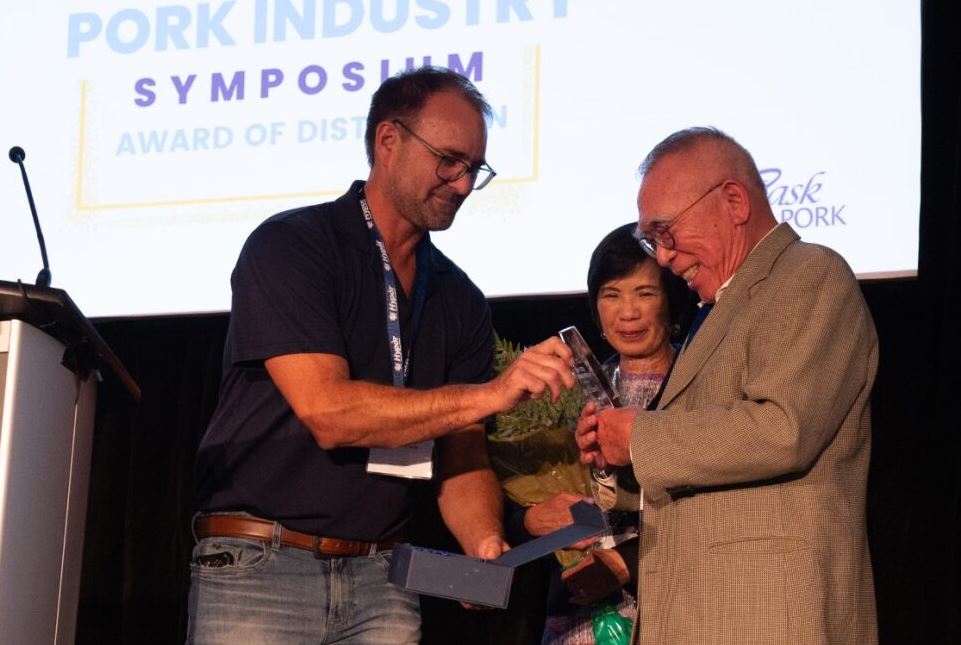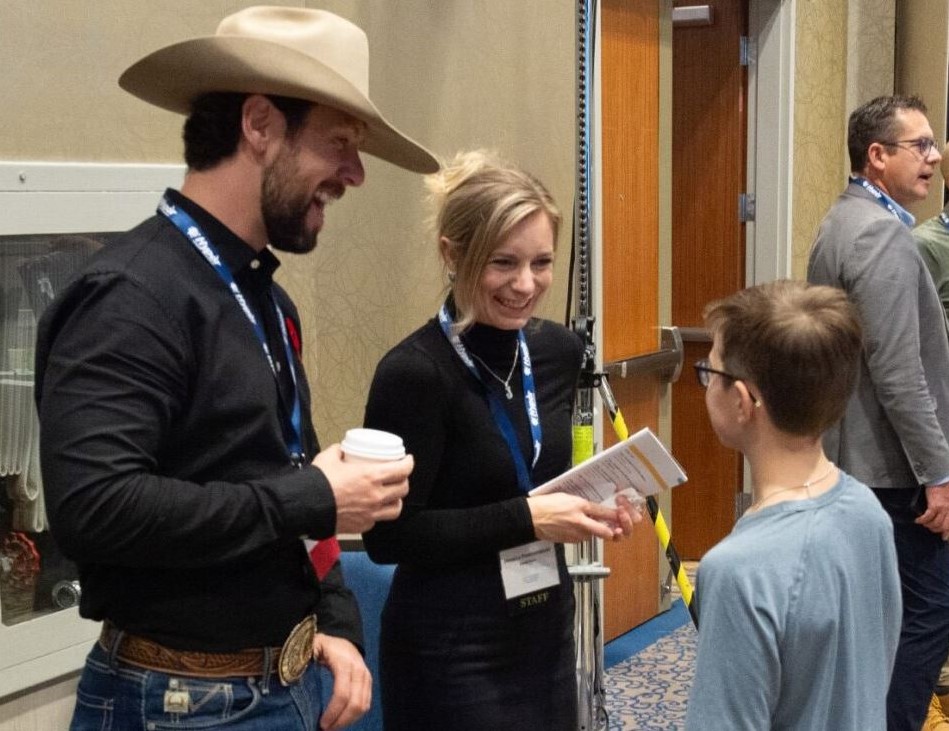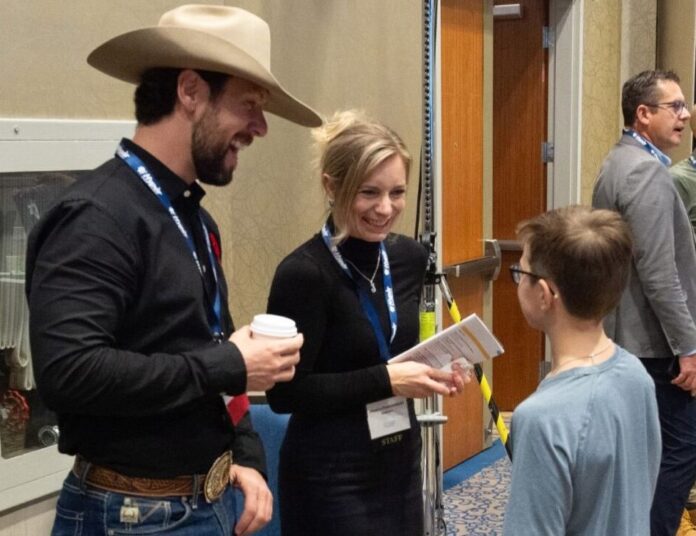By Bruce Cochrane
Editor’s note: Bruce Cochrane is Reporter and Editor, Farmscape. He can be contacted at ‘farmscape@wonderworks.ca.’
The 46th annual Saskatchewan Pork Industry Symposium took place at the Saskatoon Inn and Conference Centre on Nov. 7 & 8, welcoming more than 250 guests to learn about the latest developments in the sector.
“The purpose of symposium is to bring producers together to allow them to network and be exposed to new ideas and different production methods that they can take back to their farms,” said Mark Ferguson, General Manager, Sask Pork. “The goal is to not only strengthen their own operations but to help develop the industry, making it as economically stable and profitable as possible.”
The mood on the first day was upbeat and had been set just a week-and-a-half earlier with the official opening of the North 49 Foods sow processing plant in Moose Jaw – an exciting development for which Donald’s Fine Foods has received praise from producers, industry partners and government officials.
New cull sow plant strengthens Canadian industry

This year, in recognition of his significant and lasting impact on Saskatchewan’s pork industry, Donald Leung was presented with a Lifetime Achievement Award. Leung immigrated with his family to Canada in 1975 and held several jobs before finding himself in meat processing. He worked his way up in the business, and in 1993, with the help of three employees, he founded Donald’s Meat Distribution, renamed Donald’s Fine Foods in 2005.
The company, based in B.C., operates pork processing, distribution and further processing facilities, including its Britco plant in Langley. In 2010, Donald’s acquired Moose Jaw Pork Packers, which was renovated and renamed Thunder Creek Pork. The renovated facility has been operating for more than a decade and is now Saskatchewan’s largest federally inspected hog slaughter facility. In 2019, Donald’s purchased the former XL Foods beef processing plant in Moose Jaw with the intention of converting it into a cull sow processing facility. That renovated facility was officially opened in October, under the name North 49 Foods.
There are an estimated 240,000 cull sows available in Alberta, Saskatchewan and Manitoba, the majority of which are shipped to the U.S. for processing. The expectation is that many of those cull sows could end up being diverted to North 49.
Conveniently, during his presentation, Brett Stuart, a market analyst with Global AgriTrends, predicted increased sow liquidations over the winter as the pork sector works to restore profitability.
“We’re still living in the post-COVID hangover of free and easy money, when global stimulus packages topped 18 trillion dollars,” he said. “And now governments are in a pinch to rein in inflation – a fact that hog farmers see every time they buy fuel, fertilizer or feed.”
In addition to reducing shipping costs, processing sows in Canada avoids potential hang-ups caused by moving so many animals across the Canada-U.S. border. This issue was placed front-and-centre just last summer, when the U.S. Department of Agriculture (USDA) detected Seneca Valley Virus (SVV) in Canadian sows heading south. Since then, the Canada West Swine Health Intelligence Network (CWSHIN) has been steadfast in monitoring for SVV at Canadian assembly yards.
Industry experts champion biosecurity, handling

Preventing disease starts with proper biosecurity. Julia Keenliside, Veterinary Consultant, CWSHIN discussed CWSHIN’s biosecurity load-out project and provided practical tips for producers to make improvements.
“One of the biggest components when designing a load-out is it has to be easy to load pigs through,” she said. “It has to be easy for staff to work in and pigs have to move through it quite well.”
CWSHIN recently worked with Alberta Pork, Sask Pork and Manitoba Pork to develop a load-out fact sheet, which is available to producers through their respective provincial pork producer organizations.
In addition to ramping up biosecurity, effective animal handling can reduce stress of pigs and people alike, with performance benefits to follow. Jennifer Woods with J Woods Livestock Services explained why pigs do what they do, not what we want them to do.
“Usually, the animals are doing exactly what we are telling them to do according to where we are standing and our body language,” she said. “Once you understand their behaviors and their motivations, handling them will become much easier.”
Kendall Weger, Technical Services Specialist, PIC offered advice on piglet care and how to get the biggest bang for your buck.
“What happens on day one sets the stage for the piglets that we’re going to be weaning, and it affects the sow’s performance in subsequent liters,” she said. “It’s important to make sure the piglets are warm and dry, that they get their colostrum, and that the sows are also well cared for.”
Beyond production insights, the symposium also delivered a healthy dose of motivation, courtesy of its keynote speaker.
Long-rider’s journey inspires resilience

Best-selling author and filmmaker, Filipe Masetti Leite, brought a unique perspective to the symposium by delivering a keynote address covering his experiences as the youngest person ever to traverse the Americas by horseback – a journey that took eight years, over three separate stints, during which he visited 12 countries. Masetti’s adventure provided a compelling source of inspiration for producers who may see themselves as fighting an uphill battle, at times.
He suggested that strategic planning is the biggest step to prepare for success, getting your mind and body ready for any endeavour you choose in life. Before he embarked on his journey, Masetti spoke to other long-riders to learn of their experiences and to get advice.
“We tend to complicate things, but you don’t have to reinvent the wheel,” he said. “You have to learn who the successful people are in your field and what they did to get there, then find mentors to help you follow in their steps.”
Masetti told of the challenges he faced and of the support and generosity he received from those he encountered.
“Don’t listen to the nay-sayers,” he advised. “Understand your own mind and believe in yourself. Believe in your goals and your dreams, because if you don’t believe, no-one else will.”
Meeting Masetti was one of the highlights of the symposium for 10-year-old Reise Podhordeski, Sask Pork’s Whole Hog Youth Ambassador, who spoke with Lucas Cochrane, a youth reporter for Farmscape.
“People don’t know a lot about how we get our food,” said Podhordeski. “As the ambassador, I help represent Sask Pork and all the hog producers in the province. I’ve been able to go on tours, interview people in the industry and learn all about pigs. Then I get to share that information with other kids in their classrooms and on field trips.”
Clinton Monchuk, Executive Director, Farm and Food Care Saskatchewan echoed Podhordeski’s comments about connecting people back to what they eat.
“When there’s engagement between farmers and consumers, there’s a higher level of trust,” he said. “Confidence among consumers means that, when questions come up in the future, the consumer has a degree of familiarity that generates enhanced understanding about how food is being grown and raised.”
Following the success of this year’s Saskatchewan Pork Industry Symposium, organizers are already eagerly looking forward to the 2024 event.





